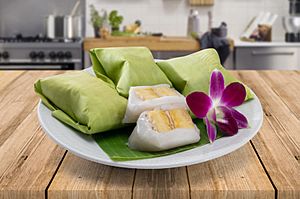Nagasari facts for kids

Nagasari, Indonesian traditional cake wrapped in banana leaves
|
|
| Course | Snack |
|---|---|
| Place of origin | Indonesia |
| Region or state | Central Java, Yogyakarta |
| Serving temperature | Room temperature |
| Main ingredients | Steamed rice flour with sugar filled with banana and wrapped inside banana leaf |
| Variations | Green, white, blue. |
Nagasari is a yummy traditional Javanese cake. People make it by steaming rice flour, coconut milk, and sugar. Inside, there's a slice of banana. This sweet treat is always wrapped in a banana leaf before cooking.
What Does Nagasari Mean?
The name Nagasari comes from two Javanese words. Naga means "a big snake" or "a dragon." In old Javanese stories, a green dragon was a mythical creature. It was believed to bring good luck and make the earth fertile. This word comes from the ancient Sanskrit word naga.
Sari has a few meanings. It can mean "beautiful," "fertile," or "patient." It can also mean "seed" or "flower." So, Nagasari can mean "the seed of the dragon" or "the beautiful dragon." Because the Javanese dragon is often green, the cake is usually made green too.
The word nagasari can also refer to other things. It is the name of a special tree. It is also the name of a specific pattern used in Batik cloth.
Different Kinds of Nagasari
Nagasari cakes usually come in a green color. This green color is the most common type. The green comes from a natural extract made from pandan leaves. Pandan leaves are often used in Southeast Asian cooking.
Sometimes, you can find white nagasaris. These are less common. In a place called Magelang, white nagasaris are known as legendo.
Today, people are getting creative with nagasari colors. You might even see blue nagasari! The blue color comes from butterfly pea flowers. These flowers give a natural blue dye.
Nagasari is a popular snack in Indonesia. You can often find it sold in traditional markets. It is a type of jajan pasar, which means a snack sold in the market.
See also
 In Spanish: Nagasari para niños
In Spanish: Nagasari para niños
 | Victor J. Glover |
 | Yvonne Cagle |
 | Jeanette Epps |
 | Bernard A. Harris Jr. |

